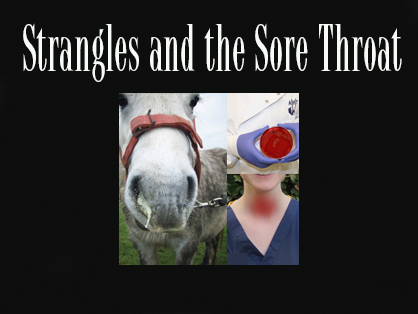How Strangles Research in Horses Can Help You From Getting “Hoarse”
By: Brittany Bevis
Along with the stunning, snowy scenery and cozy, cups of cocoa that we’re all so fond of during the holiday season, winter also brings with it a host of nasty bugs intent on spreading an onslaught of sniffly noses, watery eyes, and sore throats.
(I’ve actually contracted a particular annoying version of the cold/flu/black plague myself, while writing this very article…)
But who would’ve imagined that a new research technique developed to study Strangles in horses could help scientists better understand the bacteria that causes humans to get sore throats. It’s true! Scientists at the Houston Methodist Research Institute, in partnership with The Animal Health Trust, have identified a set of new genes that are linked to how Streptococcus pyogenes (the bacteria that causes a sore throat) survives in human saliva.
The technique they used to make this discovery was actually developed by the AHT while attempting to understand the mysterious Streptococcus equi, which causes the horrible pus-filled neck abscesses that occur with Strangles in horses. AHT’s research has been centered on how the disease is caused, the creation of vaccines, and the prevention of outbreaks in the equine population.
“We’re delighted that a technique developed at the AHT to learn more about Streptococcus equi and Strangles in horses has provided new results that could benefit people too,” said Dr. Andrew Waller, Head of Bacteriology at the AHT. “We have learned a huge amount about our bug through following the work being done on human diseases, and it’s great to be able to give something back in return. This study highlights the similarities of animal and human pathogens. We hope that our technique will also prove useful for the study and prevention of other diseases, regardless of the animal they affect.”
According to the AHT, the number of infections caused by Streptococcus pyogenes around the world has increased exponentially over the past 20 years and is responsible for 600 million cases of pharyngitis (sore throat) in people each year.
 “The bacteria is also responsible for a further 100 million cases of invasive disease including scarlet fever, acute rheumatic fever and the flesh-eating disease necrotising fasciitis, the onset of which often follows on from initial cases of pharyngitis. However, despite the cost to human health, relatively little is known about which of the approximately 1,800 genes in Streptococcus pyogenes are required for it to infect people, and persist in their throats.” (AHT, 2017)
“The bacteria is also responsible for a further 100 million cases of invasive disease including scarlet fever, acute rheumatic fever and the flesh-eating disease necrotising fasciitis, the onset of which often follows on from initial cases of pharyngitis. However, despite the cost to human health, relatively little is known about which of the approximately 1,800 genes in Streptococcus pyogenes are required for it to infect people, and persist in their throats.” (AHT, 2017)
Interestingly enough, despite the commonality of both the sore throat in humans and Strangles in horses, little is definitively known about the genes that cause the infections. In the past, research about the disease-causing capabilities of bacteria had to be carried out one gene at a time. But, the new AHT method allows all the genes in a bug to be tested at once. This technique allowed Houston scientists to identify 92 genes needed by Streptococcus pyogenes to grow human saliva in the lab.
“The ability to establish the importance of every gene in Streptococcus pyogenes within one experiment has the potential to accelerate research into this important human pathogen” says Dr. James Musser, Professor of Pathology and Genome Medicine at the Houston Methodist Research Institute. “In follow on tests, we were immediately able to confirm that six of these new genes really did affect growth in human saliva, suggesting that this new information has exciting potential for developing novel therapeutics and vaccines with which to improve human health.”
Who knew? Perhaps, one day there will be an effective vaccine for both Strangles and the sore throat!
Find out more about how AHT hopes to collaborate between the horse health sector and human health world by visiting www.aht.org.uk.











